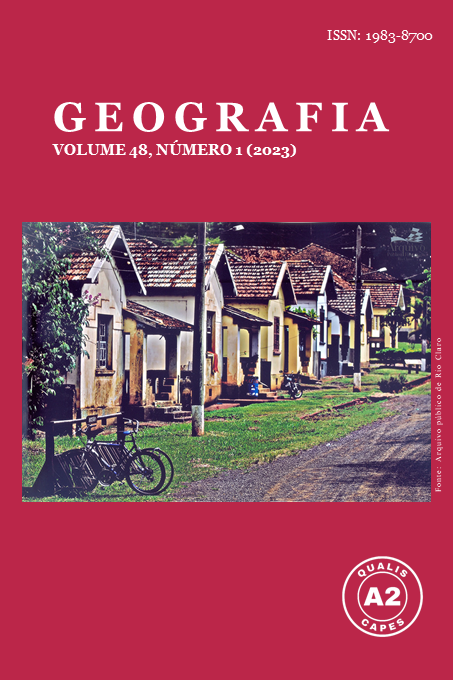METEOROLOGICAL EVENTS ASSOCIATED WITH THE EXPLOSIVE CYCLONE OCCURRED IN JUNE 2020 AND THEIR IMPACTS IN THE STATE OF SANTA CATARINA
DOI:
https://doi.org/10.5016/geografia.v48i1.16661Abstract
Extratropical cyclones are one of the atmospheric systems that most cause changes in the weather in the regions where they act. In some situations, these systems have a penetration rate of ~24 hPa/24 h, which gives them the status of explosive cyclones. Between late June and early July 2020, a cyclone, which reached explosive status, had its genesis between Rio Grande do Sul and Uruguay and rapidly moved to the ocean. In this context, the objective of the study is to describe the life cycle of the extratropical cyclone and the atmospheric systems associated with it, which caused a lot of environmental and material damage and even the death of at least 12 people in the State of Santa Catarina. (SC). Reanalysis data were used to describe the cyclone configuration, while news published by the media and data provided by the civil defense of that State were used to describe the impacts in the State of SC. Among the results, it is
highlighted that the cyclone had its genesis associated with a trough at medium/high levels of the atmosphere and that it had a deepening rate of 36 hPa in 24 hours, which gave it the characteristic of an explosive cyclone. The cold frontal branch of this system, which had its center over the ocean, acted on SC helping to form other damaging meteorological systems in the region.
Downloads
Published
Issue
Section
License
Copyright (c) 2023 GEOGRAFIA

This work is licensed under a Creative Commons Attribution 4.0 International License.
The authors maintain the copyright and grant GEOGRAFIA the right of first publication, with the articles simultaneously licensed under the Creative Commons BY 4.0 License, which allows sharing and adapting the articles for any purpose, as long as appropriate credits and provisions of image rights, privacy or moral rights. Other legal attributions can be accessed at: https://creativecommons.org/licenses/by/4.0/legalcode.en.
Geography, Rio Claro, SP, Brazil - eISSN 1983-8700 is licensed under the Creative Commons BY 4.0 License.





